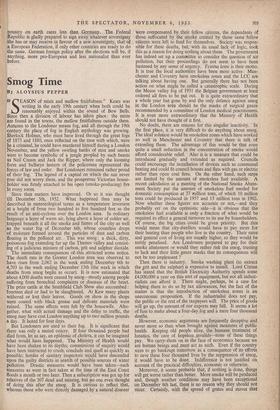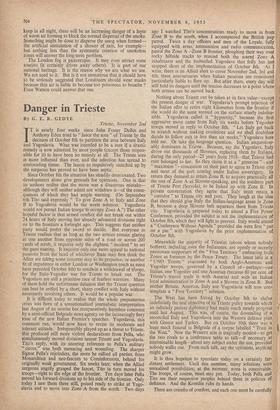Smog Time
By ALOYSIUS PEPPER EASON of mists and mellow fruitfulness." Keats was writing in the early 19th century when both could be reasonably enjoyed within the sound of Bow Bells. Since then a division of labour has taken place : the mists are found in the towns, the mellow fruitfulness outside them. Autumn to the Londoner means fog, and all through the 19th century the placp of fog in English mythology was growing. Sherlock Holmes, who must have lived through the great fogs of 1873 and 1880, once reflected on the ease with which, were he a criminal, he could have murdered himself during a London November, and the yellow swirling banks of mist and smoke were to become symbolic of a jungle peopled by such beasts as Neil Cream and Jack the Ripper, where only the looming form and bullseye lantern of the policeman represented the forces of law and order. But Condoners remained rather proud of their fog. The legend of a capital on which the sun never rose did not worry ,them, and the prosperous Victorian house- holder was firmly attached to his open (smoke-producing) fire in every room. • Since then matters have improved. Or so it was thought till December 5th, 1952. What happened then may be described in metereological terms as a temperature inversion at a height of from two hundred to five hundred feet as the result of an anti-cyclone over the London area. In ordinary language a layer of warm air, lying above a layer of colder air, trapped beneath it all the smoke and fumes of the city as well as the water fog of December 6th, whose countless drops of moisture formed around the particles of dust and carbon floating in the polluted air. This was smog : a thick, dirty, poisonous fog extending far up the Thames valley and consist- ing of a judicious mixture of carbon, grit and sulphur dioxide.
The immediate consequences of.this attracted some notice. The death rate in the Greater London area was observed to have risen from 2,062 in the week ending December 6th to 4,703 in the week ending December 13th (the week in which deaths from smog begin to occur). It is now estimated that about 4,000 deaths were caused by smog—mostly among people suffering from bronchial complaints or diseases of the heart. - The prize cattle at the Smithfield Club Show also succumbed : fourteen died or had to be slaughtered,. At Kew many plants withered or lost their leaves. Goods on show in the shops were coated with black grease and delicate materials were ruined. The same effects were felt by the housewife. Alto- gether, what with actual damage and the delay to traffic, the smog may have cost London anything up to two million pounds a day. It lasted for four days. But Londoners are used to their fog. It is significant that there was only a muted outcry. If four thousand people had died from, let us say, an epidemic of cholera, it can be imagined what would have happened. The Ministry of Health would have been shaken to its depths; commissions of enquiry would have been instructed to crush, conclude and quell as quickly as possible; hordes of sanitary inspectors would have descended upon the guilty districts in search of possible sources of water pollution. Drastic measures would have been taken—such measures as were in fact taken at the time of the East Coast floods a month or two later. Then a subscription was got up for relatives of the 307 dead and missing, but io one even thought of doing this after the smog. It is curious to reflect that, whereas those who were directly damaged by a natural disaster were compensated by their fellow citizens, the dependants of those suffocated by the smoke created by those same fellow citizens were left to fend for themselves. Society was respon- sible for these deaths, but, with its usual lack of logic, took this as a reason for doing nothing about them. The government has indeed set up a committee to consider the question of air pollution, but their proceedings do not seem to have been hastened by any sense of urgency. Festina lente is their motto. It is true the local authorities have been more active: Man- chester and Coventry have smokeless zones and the LCC are talking about having one. But generally there has not been action on what might be called a catastrophic scale. During the Meuse valley fog of 1931 the Belgian government at least ordered all fires to be put out. It is quite extraordinary that a whole year has gone by and the only defence against smog in the London area should be the masks of surgical gauze recommended by a committee of London medical practitioners. It is even more extraordinary that the Ministry of Health should not have thought of it first.
No doubt, there are reasons for this singular inactivity. In the first place, it is very difficult to do anything about smog.
The ideal solution would be smokeless zones which have worked so well in Manchester and Coventry that there is talk of extending them. The advantage of this would be that even quite a small reduction in the concentration of smoke would afford considerable relief. Also it is a measure that could be introduced gradually and extended as required. Councils could encourage the installation of devices such as communal heating and could fit council houses and flats with gas or electric rather than open coal fires. On the other hand, such steps are limited by the amount of smokeless fuel available. A recent calculation at a meeting of the National Smoke Abate- ment Society put the amount of smokeless fuel needed for domestic consumption at 37 million tons, of which 10 million tons could be produced in 1957 and 15 million tons in 1962. Now whether these figures are accurate or not,—and they probably , err on the optimistic side—it is obvious that the smokeless fuel available is only a fraction of what would be required to effect a general turnover to its use by householders.
Of course, the big cities could be given priority. But this would mean that city-dwellers would have to pay more for their heating than people who live in the country. Their rates and general cost of living are usually higher, so they would be trebly penalised. Are Londoners prepared to pay for their smoke abatement or would they rather risk the smog, trusting to luck and their little gauze masks that its consequences will not be too unpleasant ? Then there is industry. Smoke washing plant (to extract the grit and the sulphur) is expensive to install. Lord Citrine has stated that the British Electricity Authority spends some £4,000,000 a year on this sort of equipment, but not all indust- rialists can afford it. There might, perhaps, be a case for helping them to do so by tax allowances, but the fact of the matter is that the introduction of smokeless zones is an uneconomic proposition. If the industrialist does not pay, the public or the rest of the taxpayers will. The price of goods will go up, the amount of our exports may fall. It seems a 1pt of fuss to make about a four-day fog and a mere four thousand deaths.
However, economic arguments are frequently deceptive and never more so than when brought against measures of public health. Keeping old people alive, the- humane treatment of lunatics, the care of hopeless invalids—none of these things pay. We carry them on in the face of economics because we are human beings and must act as such. Even if the country were to go bankrupt tomorrow as a consequence of its efforts to save these four thousand lives by the suppression of smog, it would have to be done. Indifference is not justified on account of the practical difficulties, economic or otherwise. Moreover, it seems probable that, if nothing is done, things will get worse rather than better. More smoke will be produced and, though weather conditions may have been exceptional on December 6th last, there is no reason why they should not recur. Certainly, with the spread of grates and stoves that keep in all night, there will be an increasing •danger of a layer of warm air forming to block the normal dispersal of the smoke. Something might be done to disperse the smog when formed— the artificial stimulation of a shower of rain, for example— but nothing less than the systematic creation of smokeless zones will answer the long-term problem.
The London fog is picturesque. It may even attract some tourists (it certainly drives away others). It is part of our national heritage. It is the reason why we are what we are. We are used to it. But is it not monstrous that it should have to be seriously suggested that Londoners should wear masks because thin air is liable to become too poisonous to breathe ? Even Watson could answer that one.



































 Previous page
Previous page